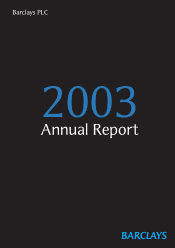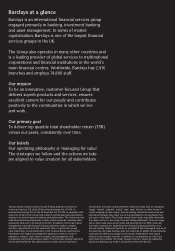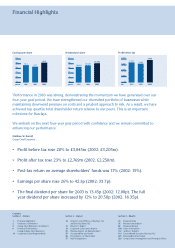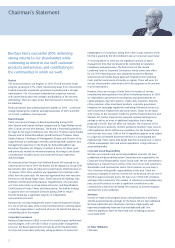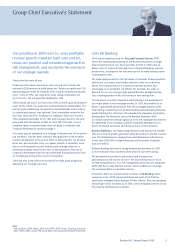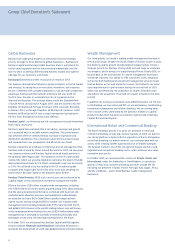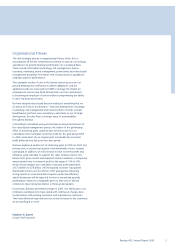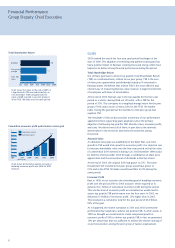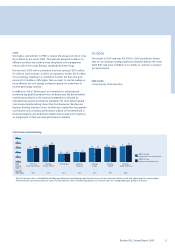Barclays 2003 Annual Report Download - page 4
Download and view the complete annual report
Please find page 4 of the 2003 Barclays annual report below. You can navigate through the pages in the report by either clicking on the pages listed below, or by using the keyword search tool below to find specific information within the annual report.
Chairman’s Statement
2
independence of its decision-taking from other Group activities. In the
UK, BGI is guided by the UK Combined Code on Corporate Governance.
A recurring theme in 2003 was the significant amount of senior
management time that continued to be committed to regulation,
compliance and governance. The final version of the revised
Combined Code on Corporate Governance, which comes into effect
for our 2004 reporting year, was a balanced document. Barclays
welcomes the principles-based approach retained in the Combined
Code, and the continuance of comply or explain. There will never be
one set of prescriptive rules which can fit all companies in all countries
in all circumstances.
However, there are no signs of relief from the number of reviews,
consultations and regulations that affect the banking industry. In 2003,
we responded to government consultations and questionnaires on
capital adequacy, payment systems, credit cards, insurance, business
crime, pensions, other investment products, corporate governance,
company law, mortgage regulation, marketing of financial services as
well as numerous employment and social issues. Today, we are faced
with reviews of the Consumer Credit Act and the Financial Services and
Markets Act, further inquiries into payment systems and long-term
savings as well as an array of additional legislation that is being
proposed in the EU that will affect our industry. The Chairman of the
Financial Services Authority recently pointed to fourteen major sources
of EU legislation which will become mandatory for the financial sector
over the next four years. Little of the EU legislation appears to be subject
to a rigorous cost benefit assessment before it is promulgated and
implemented. There seems little doubt that the increased cost, in terms
of both management time and actual expenditure, is high relative to
associated benefits.
Corporate Social Responsibility
We take our corporate and social responsibilities seriously. We have
established a Brand and Reputation Committee with responsibility for
Corporate Social Responsibility issues Group-wide. We are committed to
behaving in a manner that is worthy of the trust of our staff, customers,
shareholders and communities and in Chris Lendrum we now have a
Vice-Chairman with specific responsibilities in this area. There are
numerous examples of activity of which we can be proud. We are one of
the UK’s largest corporate givers. We have over 17,000 staff volunteers
working in the community. The number of volunteers is increasing every
year; our staff continue to make a significant contribution to the
communities in which we are based. We continue to promote Equality
and Diversity in the workplace.
Summary
Overall, we made much progress across a broad-based set of activities,
and this positions Barclays strongly for the future. We are well-capitalised.
We have a distinctive set of businesses. We have a high quality and
experienced leadership team and loyal and dedicated staff. I am
extremely grateful to them for their hard work in helping us achieve
a successful 2003.
Sir Peter Middleton
Chairman
Barclays had a successful 2003, delivering
strong returns to our shareholders while
continuing to invest in our staff, customer
products and services, and contributing to
the communities in which we work.
Market
The economic picture was brighter in 2003. The UK economy made
progress, growing at 2.1%, whilst repositioning away from consumption
towards corporate investment, government spending and a stronger
trade balance. The US economy embarked on a vigorous recovery,
with uncertainties about the strength and durability of the recovery
diminishing. There are signs at last that the Eurozone economy may
be stabilising.
Financial markets also witnessed greater stability in 2003 – a welcome
change following the volatility and depressed state of 2001 and 2002.
As a result, confidence has improved.
Board Changes
There were several changes in Board membership during 2003.
John Stewart and Graham Wallace resigned and Sir Nigel Mobbs retired
after 23 years service with Barclays. The Board is immensely grateful to
Sir Nigel for his huge contribution over this time. Professor Dame Sandra
Dawson and Sir Richard Broadbent joined the Board. Professor Dame
Sandra Dawson is Professor of Management Studies and Director of the
Judge Institute at Cambridge University, and brings both academic and
management experience to the Board. Sir Richard Broadbent was
Executive Chairman, Her Majesty’s Customs & Excise, for three years
and previously worked in investment banking. He brings to the Board
a combination of public sector and corporate finance experience
and knowledge.
We announced last October that Matthew Barrett will succeed me as
Chairman at the end of 2004. Mr Barrett will be replaced as Group Chief
Executive by John Varley who became Group Deputy Chief Executive on
1st January 2004. Chris Lendrum was appointed Vice-Chairman with
effect from the same date. We have also appointed four new executive
Directors to the Board: Roger Davis, Chief Executive UK Banking; Gary
Hoffman, Chief Executive Barclaycard; Naguib Kheraj, who has taken
over from John Varley as Group Finance Director; and David Roberts,
Chief Executive Private Clients and International. We shall be looking
to appoint new non-executive Directors during 2004 to ensure
that the Board has a significant majority of independent
non-executive Directors.
Barclays has a strong management team to take the business forward.
It is one of the key tasks of the Group Chief Executive to develop talent
so that the organisation is well led at all levels. Mr Barrett has done an
outstanding job in this regard.
Corporate Governance
Barclays Global Investors (BGI) is one of the world’s largest institutional
asset managers, with over US$1 trillion in assets under management.
Last year, the Board approved the process by which BGI determines
its Corporate Governance and proxy voting guidelines to ensure the

